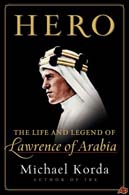Hero: The Life and Legend of Lawrence of Arabia – Book Review
 Hero: The Life and Legend of Lawrence of Arabia by Michael Korda. HarperCollins 2010 (699 pages with maps and illustrations)
Hero: The Life and Legend of Lawrence of Arabia by Michael Korda. HarperCollins 2010 (699 pages with maps and illustrations)
There are only a very few individuals prominent at the turn of the last century who have retained public recognition; Theodore Roosevelt, Mark Twain (whose autobiography was only released this past year), Rudyard Kipling, Manfred von Richtofen, aka “The Red Baron,” and Thomas Edward Lawrence, better known as “Lawrence of Arabia.” About the latter scores of books have been written ranging from unvarnished praise to excoriating expose’s belittling the man and denouncing him as an effete homosexual poseur. In all too many cases one is reminded of the line uttered by the character of the newspaperman at the close of the John Ford film The Man Who Shot Liberty Valance when he declaimed “When the myth becomes legend, print the legend.”
{default}Michael Korda however has not succumbed to this admonition. In this exceptional volume Korda examines one of the great and still mysterious figures of the 20th century T.E. Lawrence. Born the illegitimate son of minor nobility he grew up in rather a sylvan environment with a strict mother and a father who doted on him surrounded by siblings whom he very obviously loved. A remarkably slight figure of short stature he eschewed the usual team sports of British schoolboys in favor of solitary pursuits bicycling, boating, or hiking vast distances. Strangely enough he was never really taken to task by his contemporaries who although finding him rather an odd duck seemed always to like him and respect his choices. Despite his proclivity for playing pranks young Lawrence was also a remarkable scholar traveling vast distances to study and sketch castles built during the Crusades. His sharp mind and erudite papers were of such a high caliber to have him recruited by the eminent scholar David Hogarth for archaeological digs in the Middle East. This is where his connection with that region of the world begins … but it is only the beginning.
When the world is shattered by the cataclysm of the First World War T.E. Lawrence is quickly drawn into the fray initially as a cartographer and Arabic translator for Great Britain’s fledgling military intelligence network in Cairo. It is not long before the casual second lieutenant is thrust into the conflict in the Middle East and casts himself in the role of organizer and director of an Arab Revolt designed to drive out and destroy the forces of the crumbling Ottoman Empire. It is this phase of Lawrence’s life with which we are most familiar; with the image of the diminutive Englishmen barefooted, in flowing robes and headdress striding across the sand and flinty wastes of Syria and Palestine. He is the self-taught demolitions expert blowing up railroad bridges and miles of track, the fearless guerrilla leader casually blazing away at Turkish troops with revolver or Enfield and traversing miles of desert on camel under a merciless sun. Korda recounts these days with infinite care and admirable attention to detail while never becoming pedantic or pontifical. Instead Korda’s research delves deeper into the psychology and experiential influences on Lawrence which will serve to shape the man who is often described as “backing into the limelight” of history. For all of his peculiarities Lawrence is never far from the centers of power and moves easily within a circle of friends and allies which includes such diverse figures as Winston Churchill, Gertrude Bell, Robert Graves, and George Bernard Shaw. Even the notoriously punctilious British monarch George V tolerates Lawrence’s eccentric nature and behavior for he is that magnetic and engaging an individual.
Lawrence, for all of his success on the battlefield is bitterly disappointed with the peace that follows and the Western statesmen who proceeded to carve up the Middle East without regard to the achievements or wishes of the indigenous populations. He was at the same time disenchanted with the Arab peoples he had striven to liberate. In what appears to be an undiagnosed case of what is now termed post-traumatic stress disorder (PTSD) Lawrence withdraws from the world at large changing his name and serving as an enlisted man in the fledgling RAF. Never in this work does Korda presume to pass judgment on Lawrence or his actions. Instead he tells his story. Neither a cheerleader nor a critic Korda instead is what is most welcome in the story of this fascinating individual – a biographer. For anyone who wishes to attempt to understand the enigma of T.E. Lawrence this book is a must have.
Frederick J. Chiaventone — Award-winning novelist, screenwriter, and television commentator is a retired cavalry officer who taught National Security Strategy, counterinsurgency, and counter-terrorist operations at the U.S. Army’s Command and General Staff College. He is the author of the acclaimed historical novels “A Road We Do Not Know” and “Moon of Bitter Cold.” His article on T.E. Lawrence (“Legend Become Fact”) appeared in the December 2008 edition of Armed Forces Journal. He’s delighted to have a First American Edition (1927) of “Revolt in the Desert” in his library.

